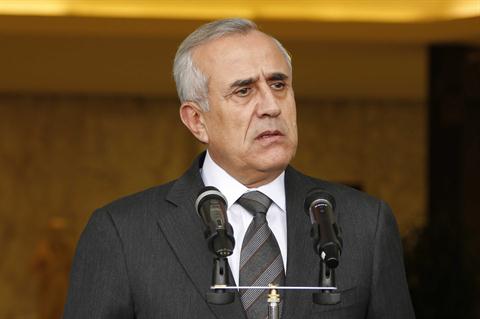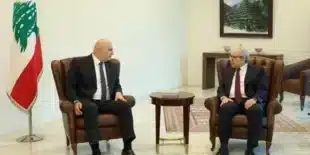BEIRUT: Lebanon’s dialogue session scheduled for Nov. 29 is ongoing despite the March 14-led opposition’s decision to abstain from the all-party-talks until the resignation of Prime Minister Najib Mikati’s government, sources close to Baabda told The Daily Star Tuesday.
According to Baabda sources, President Michel Sleiman still insists on holding the scheduled session on Thursday, hoping his more than month-long efforts will succeed in bringing back political rivals again.
Sleiman’s call, however, doesn’t seem to be well received among the concerned parties, especially the opposition group, still adherent to the stances declared following the October 19 assassination of a top security official, Brig, Gen, Wissam al-Hasan in Ashrafieh’s car blast, mainly to boycott the Cabinet.
To increase pressure on Mikati, the March 14 coalition also set the government’s resignation as a precondition to resume dialogue. The opposition group accuses Hezbollah’s main ally, President Bashar Assad, of being behind the killing and holds Mikati’s Cabinet responsible.
Future MP Ammar Houry told The Daily Star on Tuesday that his group continue boycotting the all-party talks, despite intensive efforts in the last month to convince the opposition to back off his stance.
“We previously declared our stance and there is no backing off,” said Houry.
According to Houry, attending dialogue to discuss the Cabinet crisis will be against constitutional norms, which stipulate a change in government should not be discussed through dialogue.
“Dialogue was intended to discuss a defense strategy to the country, and not a change in government,” said Houry.
He added that Hezbollah has made it clear it’s not willing to hand over its arms to the state, hinting at statements by Hezbollah chief Sayyed Hasan Nasrallah that the resistance is Lebanon’s guarantee in responding to any possible war with Israel.
Similarly, a Kataeb party source told The Daily Star that Nasrallah’s Sunday statements have stopped the possibility of dialogue.
“The president cannot call for dialogue in the absence of sectarian balance among participants,” said the source, in reference to the Future Movement’s firm decision to boycott dialogue.
The source added that the absence of the representatives of the Sunni sect, in reference to the Future Movement, make dialogue unrealistic.
Nasrallah, who heads the March 8 coalition in the country, reiterated Sunday his party’s willingness to engage in National Dialogue, however he said he refuses the March 14 coalition’s “arrogant attitude.”
“We are ready to respond to [President Michel Sleiman’s] invitation for [National] Dialogue on Nov. 29 but we reject conditions by anyone with regard to Dialogue and those being pompous [toward us on this matter],” he said.
Also trying to find solution to the country’s political deadlock, Progressive Socialist Party Leader MP Walid Jumblatt has launched a comprehensive initiative that will include all parties aimed at “preventing strife” and engaging political rivals.
Jumblatt’s initiative has so far gained the support of Lebanon’s three leaderships, President Michel Sleiman, Prime Minister Najib Mikati and House Speaker Nabih Berri, following visits by a PSP delegation to the three leaderships.
The PSP delegation will still hold discussions with the March 14 politicians and a number of other dignitaries.


